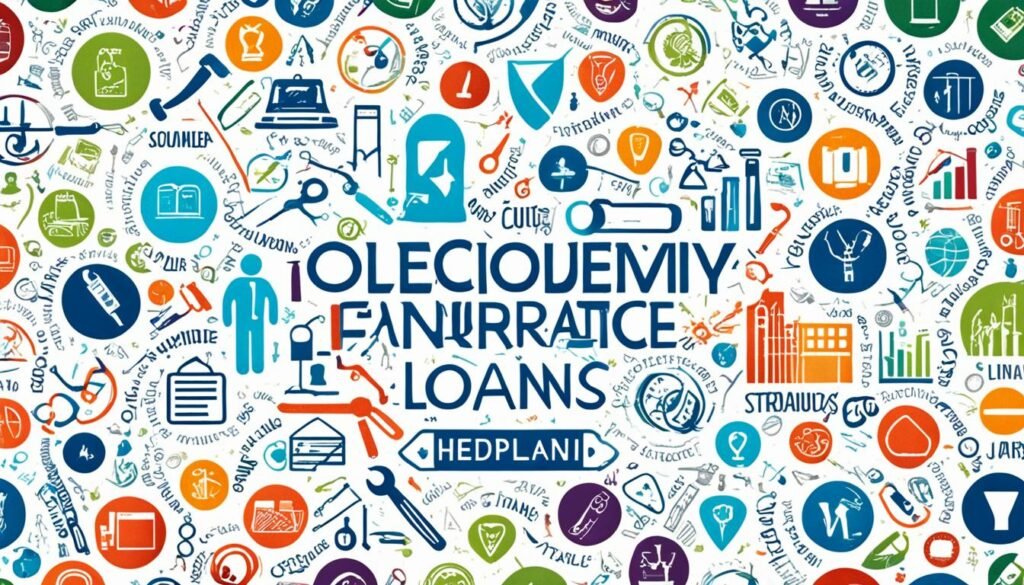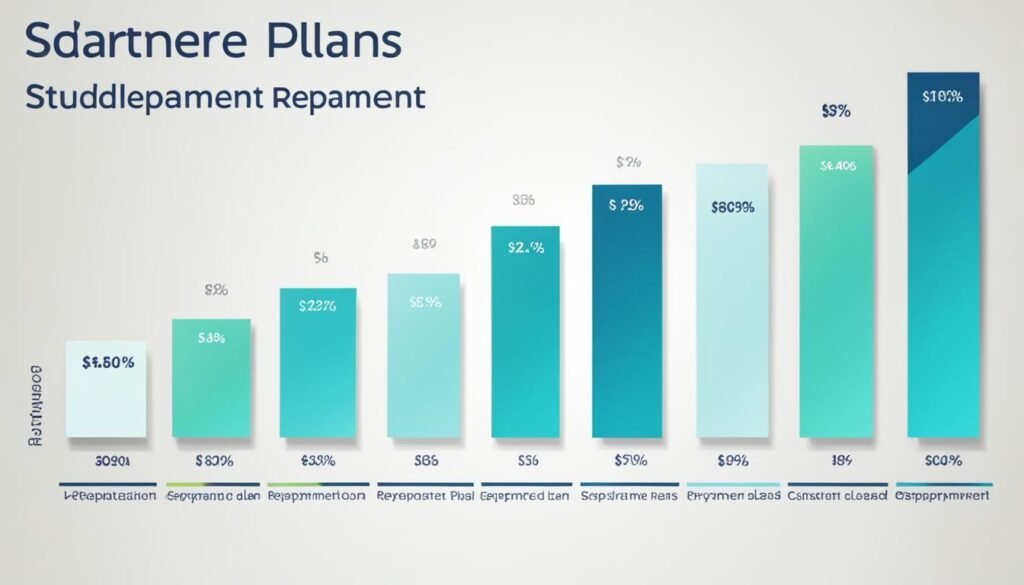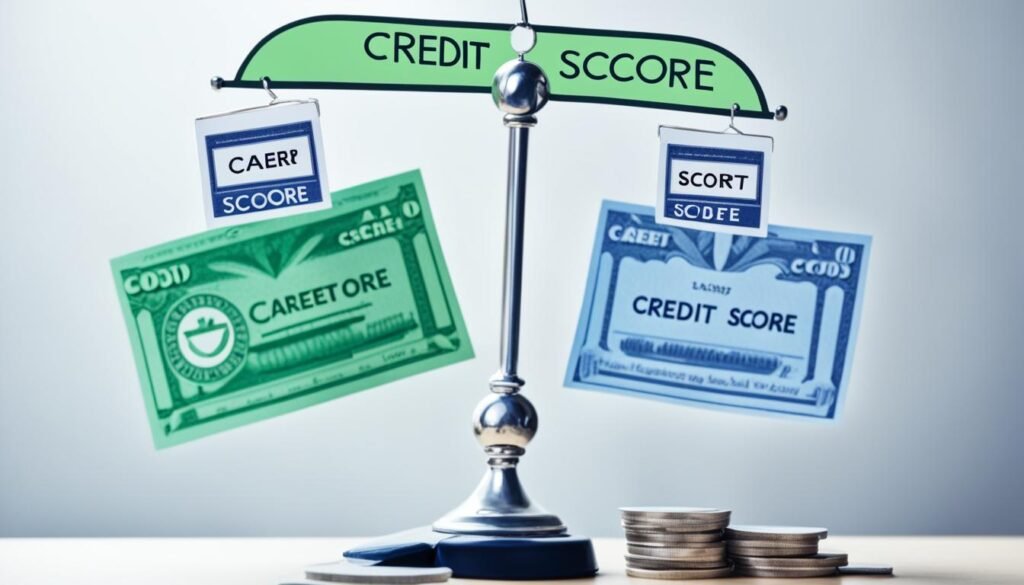Table of Contents
ToggleGoing after a career in a specialized field often means you need specific training and education. This can be expensive. Career education loans are here to help cover these costs. They’re for students and those starting a career in fields like trade schools, vocational programs, and professional certification courses.
These loans are different from the usual student loans for colleges and universities. They offer more flexibility. You can use them to pay for up to 100% of your career training costs.
Key Takeaways : Career Education Loans
- Career education loans are a specialized financing option for students pursuing vocational, trade, or professional certification programs.
- They offer more flexibility than traditional student loans, allowing you to cover up to 100% of your educational costs.
- Career education loans provide a range of repayment options, including income-based plans, to help make your financing manageable.
- Eligibility for career education loans is based on factors like your field of study, the accreditation of your program, and your credit history.
- Exploring career education loans can be a strategic way to invest in your professional development and achieve your career goals.
Understanding Career Education Loans
Career education loans help students pay for vocational, trade, or professional certification programs. They are different from traditional student loans. These loans offer more flexibility and repayment options for students in career-focused education.
Also Read: What Are The Common Loan Terms?
What are Career Education Loans?
These loans are for students in career-focused programs. They can be used for technical schools, trade schools, vocational colleges, and some four-year universities. Unlike federal loans, these loans have easier requirements and can cover up to 100% of the program’s cost.
How Career Education Loans Differ from Traditional Student Loans
These loans have less strict credit requirements. This means students with little credit can qualify. They also offer flexible repayment plans. These plans are made for students in career-focused programs.
Also Read: What Are The Most Common Types Of Structured Finance Instruments?
| Feature | Career Education Loans | Traditional Student Loans |
|---|---|---|
| Eligibility | More flexible credit requirements | Stricter credit requirements |
| Repayment Options | Tailored to career-focused programs | One-size-fits-all repayment plans |
| Loan Limits | Can cover up to 100% of program costs | Typically limited to a percentage of program costs |
Knowing about career education loans helps students choose the best financing for their career goals.
Benefits of Career Education Loans

Career education loans have big advantages over traditional student loans. They are perfect for those in vocational, trade, or professional certification programs. These loans offer flexible repayment and cover all costs, making it easier to reach your goals.
Also Read: What Are The Different Types Of Finance Services Available To Individuals And Businesses?
Flexible Repayment Options
One major perk of career education loans is their flexible repayment. Unlike regular student loans with strict schedules, these loans offer various repayment plans. You can choose from income-based repayment, where your payments adjust with your income. This makes it easier to manage your finances during income changes.
Cover Up to 100% of Costs
These loans cover more than just tuition and fees. They help pay for tuition, fees, books, supplies, and even living expenses. This lets you focus on your studies without financial stress. It’s especially useful for students in trade or vocational programs with higher costs.
Career education loans offer flexible repayment and cover many education costs. They’re great for those investing in specialized training or certification. Whether you’re in a trade, vocational, or professional program, these loans help you reach your goals affordably.
Also Read: Understanding The Application Process For Loan Subsidies: Step By Step Guide
Eligibility Requirements for Career Education Loans

Getting a career education loan is key to reaching your professional dreams. But, you need to know the rules before you apply. To get these loans, students must meet certain criteria:
Also Read: What Are The Key Skills And Qualifications Needed For A Successful Finance Career?
- Credit Score: Lenders look at your credit score to decide if you’re eligible. A good score can help you get the loan and better terms.
- Income: Lenders check your income to make sure you can pay back the loan. They look at your job, how stable it is, and your future earnings.
- Cosigner: Some lenders want a cosigner, like a parent or guardian, to sign the loan with you. This can help if your credit isn’t great.
- Accredited School: You can only get loans for programs at accredited schools. Make sure your school fits the lender’s rules.
- Enrollment Status: You must be enrolled at least half-time in your program and doing well academically.
- Citizenship Status: You might need to be a U.S. citizen or a permanent resident with a social security number to get these loans.
Knowing these rules helps students get ready for the loan process. It also boosts their chances of getting the money they need for their goals.
Top Lenders for Career Education Loans

Students looking to fund their career-focused education have many loan options. These include federal student loans and private lenders like Sallie Mae and College Ave. Let’s look at the main differences between these choices.
Federal Student Loans
Federal student loans, such as Direct Subsidized Loans and Direct Unsubsidized Loans, are for eligible students at accredited schools. They offer fixed interest rates and flexible repayment plans. Students must meet certain requirements like financial need, enrollment status, and citizenship to get these loans.
Private Lenders like Sallie Mae and College Ave
Private career education loans from lenders like Sallie Mae and College Ave offer more financing options. These loans have variable interest rates and might need a credit check or a cosigner. They can cover up to 100% of career program costs, including tuition, fees, and other expenses.
| Lender | Interest Rates | Repayment Terms | Eligibility |
|---|---|---|---|
| Federal Student Loans | Fixed rates, typically lower than private loans | Flexible, with options for income-driven repayment | Based on financial need, enrollment status, and citizenship |
| Sallie Mae | Variable rates, often higher than federal loans | Flexible, with options for deferment and forbearance | Credit check and/or cosigner may be required |
| College Ave | Variable and fixed rates available | Flexible, with options for in-school and deferred repayment | Credit check and/or cosigner may be required |
When looking at career education loans, it’s important to compare federal and private options. Look at interest rates, repayment terms, and eligibility to find what suits your needs best.
Applying for Career Education Loans

Getting financing for your career-focused education is easy, whether you’re looking at federal or private loans. Knowing the steps helps you apply with ease and move towards your career goals smoothly.
Steps to Apply for Federal and Private Loans
- Complete the FAFSA: Start with the Free Application for Federal Student Aid (FAFSA). It asks about your finances to see if you qualify for aid, like career education loans.
- Gather Required Documentation: You’ll need things like tax returns, pay stubs, and details about your enrollment status and satisfactory academic progress. These are needed for both federal student loans and private career education loans.
- Submit a Loan Application: For private career education loans, fill out an application with a lender like Sallie Mae or College Ave. This might include a credit check and possibly needing a cosigner.
- Obtain School Certification: Your school must confirm your enrollment status and cost of attendance before your career education loan can be given to you.
By following these simple steps, you can apply for both federal student loans and private career education loans. This ensures you have the money you need to follow your career dreams.
Repayment Options for Career Education Loans
When it comes to paying back your career education loans, you have several choices. Whether you have federal or private student loans, knowing the repayment plans can help you manage your debt better. Let’s look at the main ways to pay back career education loans.
Fixed Repayment
The fixed repayment plan is a favorite for many. You’ll pay the same amount every month for the whole loan term. This makes payments predictable and helps with financial stability as you start your career.
Income-Based Repayment
If your income changes often, the income-based repayment plan could be a big help. It bases your monthly payments on a part of your income that you can afford. This is great for those in careers with changing income.
Grace Period and Deferment
Federal student loans and private student loans both offer a grace period. This lets you delay starting payments after you graduate. You might also get deferment or forbearance if you’re having financial trouble or going back to school.
Dealing with career education loan repayment can seem tough, but knowing your options helps you make smart choices. By looking into these plans, you can find the right one for your financial goals and career path. This way, you can set yourself up for financial success in the long run.
Income-Based Repayment Plans

For those looking into career education loans, income-based repayment plans can change the game. These plans make loan payments easier to handle, especially for those starting in fields with lower pay. They’re great for managing career education loans.
How Income-Based Repayment Works
Income-based repayment plans set your payments based on what you earn, not your loan size. Your payments can be a set percentage of your income, usually 10-20%. As your income goes up, so do your payments, but you can pay back your loan over 25 years if needed.
This plan is great for those facing financial struggles. It can make career education loans much easier to handle. Plus, working in public service could lead to loan forgiveness after 10 years of regular payments.
“Income-based repayment plans have been a lifesaver for me. As I built my career, my monthly payments have remained manageable, which has allowed me to focus on achieving my professional goals.”
– *Jane Doe, Graphic Designer*
To look into income-based repayment for federal student loans or private student loans, check out the requirements and how to apply with your lender or the U.S. Department of Education.
Career Education Loans and Your Credit Score

Financing your career education is important, and knowing how loans affect your credit score is key. Career education loans, like other student loans, can both help and hurt your credit.
Lenders check your credit during the application process with a hard credit check. This can lower your credit score by a few points. But, if you have a good credit history and meet the credit requirements, you might get the loan. This can help improve your credit over time.
After getting a career education loan, your credit decision and how you pay back the loan are reported to credit bureaus. Paying on time can raise your credit score. It shows you can handle debt well.
But, missing or paying late can lower your credit score. It’s crucial to keep up with your loan payments to avoid hurting your credit.
If you’re worried about how a career education loan will affect your credit score, ask the lender about a soft credit check. This check doesn’t change your score and lets you see if you’re likely to get the loan without a hard inquiry.
Managing your career education loans well is important for a good credit score. It sets you up for financial success later on.
“Proper planning and responsible borrowing can help students maximize the benefits of career education loans while minimizing the impact on their credit profile.”
Comparing Career Education Loans to Other Financing Options

Students looking to finance a trade, vocational, or professional certification program have more than just career education loans to consider. These options offer flexibility and help in reaching educational and career goals.
Federal student loans are a choice, offering fixed interest rates and plans based on income. Grants and scholarships provide funding that doesn’t need to be paid back. Income-share agreements let students pay a part of their future earnings for education funding.
| Financing Option | Key Features | Advantages | Drawbacks |
|---|---|---|---|
| Career Education Loans | Designed for vocational and trade programs, flexible repayment options | Cover up to 100% of cost of attendance, tailored to specific program needs | May have higher interest rates and stricter credit requirements than federal loans |
| Federal Student Loans | Fixed interest rates, income-driven repayment plans | Generally lower interest rates and more lenient credit requirements | May not cover the full cost of attendance for some programs |
| Grants and Scholarships | Funding that does not need to be repaid, based on academic merit or financial need | Provide “free” money for education, no repayment required | Highly competitive, may not cover the full cost of attendance |
| Income-Share Agreements | Students agree to pay a percentage of future income in exchange for educational funding | Flexible repayment terms based on income, can be a viable alternative to loans | Potential long-term cost may be higher than traditional loans, complex agreements |
When looking at financing for your career education, it’s key to compare interest rates, repayment terms, and credit requirements. This helps find the best option for your needs and goals.
Career Education Loans
Borrow Responsibly
When looking into career education loans, it’s key to borrow wisely and check out all your options. These loans can help you reach your career goals, but you must think about the long-term effects and plan for paying back responsibly.
Think about the future earnings in your field when deciding on loans. This helps you figure out a budget for monthly loan payments that you can handle. Also, try to use grants and scholarships first before looking at private student loans or getting a cosigner.
- Look into federal student loans before checking out private student loans.
- Do your homework on each loan’s terms, like interest rates, repayment plans, and any extra fees or penalties.
- Make a budget that includes your expected monthly loan payments and matches your future income.
- Borrow only what you really need to avoid financial trouble later.
By borrowing responsibly and making smart choices, you can get the most out of career education loans. This way, you can reduce risks and secure a solid financial future.
Budgeting for Career Education Loan Repayment

Starting your career education journey means you need a solid budget and plan for loan repayment. Good financial planning helps you manage your monthly payments. It also keeps you from missing deadlines and keeps your credit score healthy.
When planning your budget for career education loans, think about these important points:
- Anticipated Monthly Payments: Look at your loan’s terms, like interest rates and repayment times, to figure out your monthly payments.
- Expected Income: Think about your future earnings based on your career choice. This helps you see if you can afford your monthly payments.
- Other Expenses: Include your living costs, like rent, utilities, transport, and food, in your budget. This makes sure you cover all your expenses.
Don’t forget about your grace period and options like deferment or forbearance if money gets tight. But, planning ahead and making a solid budget helps you stay on top of your career education loan repayment.
| Budgeting Considerations | Estimated Amounts |
|---|---|
| Monthly Loan Payment | $300 |
| Expected Monthly Income | $4,000 |
| Rent and Utilities | $1,200 |
| Food and Groceries | $500 |
| Transportation | $200 |
| Other Expenses | $400 |
| Remaining Discretionary Income | $1,400 |
By budgeting well for your career education loan repayment, you can smoothly move into your new career. This also sets you up for a financially secure future.
Also Read : What Are Personal Loan And How Do They Work?
Conclusion
Career education loans help those going for vocational training, trade school, or professional certification. They give the money needed to pay for these programs. These programs can lead to better jobs and higher pay.
Knowing about career education loans is key. They offer flexible ways to pay back and can cover up to 100% of costs. This makes it easier for students to plan their education and finances. Plus, they don’t hurt your credit score and you can choose from federal or private loans.
If you want to improve your skills, switch careers, or start a new job path, think about career education loans. Plan your budget and look at all your financing options. This way, you can move forward to a career that makes loan isn’t attending school in the u.s you happy and successful career loans attending school in the u.s.
FAQs
Q: What are student loans for trade school?
A: Student loans for trade school are financial products specifically designed to help students cover the costs associated with attending trade schools and career training programs. These loans can be federal or private and often offer flexible repayment terms to accommodate students’ financial situations.
Q: How can I apply for private student loans for trade?
A: To apply for private student loans for trade, you typically need to research lenders, compare loan options, and gather required documents such as proof of income and credit history. Some lenders also allow you to apply with a cosigner to improve your chances of approval.
Q: What are the differences between federal student loans for trade and private student loans for trade?
A: Federal student loans for trade typically offer lower interest rates, flexible repayment options, and potential forgiveness programs. Private student loans for trade may have varying interest rates and terms based on the lender and your creditworthiness.
Q: What is a career training loan?
A: A career training loan is a type of financing specifically aimed at individuals pursuing vocational training or attending trade schools. These loans can cover tuition, fees, and other expenses associated with career training programs.
Q: What should I consider when choosing trade school loans?
A: When choosing trade school loans, consider factors such as the interest rate, repayment term, fees, and whether the loan offers a deferment option while you’re in school. It’s essential to evaluate the total cost of the loan, including principal and interest, over the life of the loan.
Q: Can I use a smart option student loan for career training?
A: Yes, a smart option student loan® can be used for career training, provided you meet the lender’s criteria and the program is eligible for financing. These loans often feature competitive interest rates and flexible repayment terms.
Q: How do I find the right loan for attending trade school?
A: To find the right loan for attending trade school, start by researching different loan options, including federal and private student loans for trade. Consider your financial situation, credit score, and the total cost of borrowing, including interest rates and repayment terms.
Q: What are the repayment terms for career training student loans?
A: Repayment terms for career training student loans vary depending on the lender and the type of loan. Generally, federal student loans for trade have a standard repayment term of 10 years, while private loans may offer shorter or longer terms based on the agreement.
Q: Are there loans to pay for training and trade certificate courses?
A: Yes, there are loans available to pay for training and trade certificate courses. These can include federal student loans for trade schools and private student loans specifically designed for vocational training. Be sure to check eligibility requirements for each loan type.





